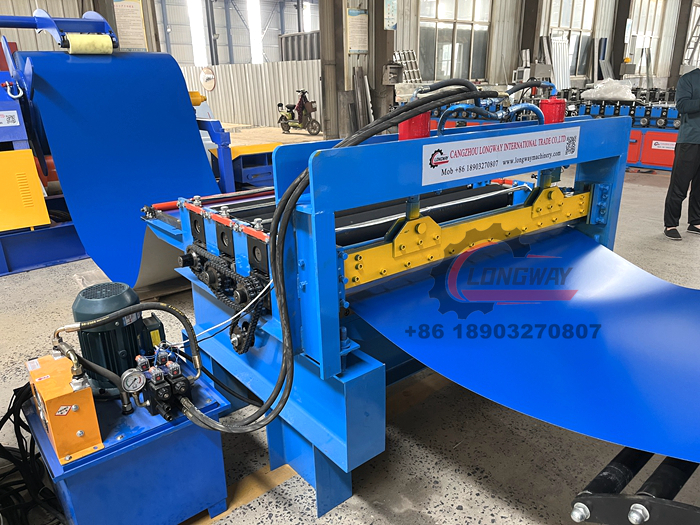custom corrugated roof sheet roll forming machine
Custom Corrugated Roof Sheet Roll Forming Machine
In the modern construction industry, the demand for durable, cost-effective, and aesthetically pleasing roofing solutions is paramount. Among the various options available, corrugated roofing sheets have gained significant popularity due to their strength, lightweight nature, and ease of installation. To meet this rising demand, businesses in the manufacturing sector are increasingly turning to custom corrugated roof sheet roll forming machines. These highly specialized machines play a crucial role in producing corrugated roofing sheets that cater to specific customer needs.
Understanding the Roll Forming Process
The roll forming process involves feeding a continuous strip of metal through a series of rollers that gradually shape the material into the desired profile. For corrugated roofing sheets, the process begins with a flat metal coil, often made of galvanized steel, aluminum, or other materials. As the coil passes through the roll forming machine, it is shaped into a wave-like pattern that enhances its structural integrity while minimizing weight. This method allows for high-speed production, ensuring that businesses can meet consumer demands efficiently.
Customization The Key to Competitive Advantage
One of the standout features of modern corrugated roof sheet roll forming machines is their ability to be customized. Customization can occur in various aspects, including the dimensions of the roofing sheets, the type of material used, and the profile design. For instance, manufacturers can create sheets of varying widths, lengths, and thicknesses to suit specific applications, whether for residential buildings, industrial facilities, or agricultural structures.
Moreover, these machines can produce a variety of corrugated profiles, ranging from traditional designs to contemporary styles. By offering tailored solutions, manufacturers can differentiate themselves in a competitive market, attracting diverse clientele who seek unique roofing solutions.
Efficiency and Cost-Effectiveness
custom corrugated roof sheet roll forming machine

Investing in custom roll forming technology translates to significant efficiency gains for manufacturers. Traditional roofing production methods often require multiple processes and labor-intensive operations, leading to higher costs and longer lead times. In contrast, a roll forming machine can produce a continuous supply of roofing sheets with minimal waste and quicker turnaround times. This efficiency is crucial in a market that values speed and reliability.
Additionally, the precision of roll forming reduces the need for secondary operations, such as cutting and welding, making the manufacturing process more cost-effective. Many machines are equipped with advanced controls and automation features that streamline workflow and minimize human error, further enhancing productivity.
Market Trends and Future Outlook
The demand for corrugated roofing materials is anticipated to grow in the coming years, propelled by trends in urbanization, industrialization, and sustainability. As more businesses and consumers opt for eco-friendly building materials, the use of recycled metals in corrugated sheets is becoming more prevalent. Custom roll forming machines can accommodate these materials, allowing manufacturers to produce green solutions that align with current market trends.
Furthermore, advancements in technology, such as the Internet of Things (IoT) and artificial intelligence (AI), are poised to transform the roll forming industry. These technologies can facilitate real-time monitoring and predictive maintenance, ensuring that the machines operate at peak performance and reducing downtime.
Conclusion
In summary, custom corrugated roof sheet roll forming machines represent a pivotal aspect of the modern roofing industry, offering manufacturers the ability to create tailor-made solutions that meet diverse customer demands. With their speed, efficiency, and potential for customization, these machines not only enhance product offerings but also contribute to overall business success. As the construction sector continues to evolve, so too will the capabilities and technologies behind roll forming, ensuring that corrugated roofing remains a premium choice for builders and homeowners alike. Embracing innovation in this field will be key for businesses looking to thrive in a competitive marketplace.
-
Roof Panel Machines: Buying Guide, Types, and PricingNewsJul.04, 2025
-
Purlin Machines: Types, Features, and Pricing GuideNewsJul.04, 2025
-
Metal Embossing Machines: Types, Applications, and Buying GuideNewsJul.04, 2025
-
Gutter Machines: Features, Types, and Cost BreakdownNewsJul.04, 2025
-
Cut to Length Line: Overview, Equipment, and Buying GuideNewsJul.04, 2025
-
Auto Stacker: Features, Applications, and Cost BreakdownNewsJul.04, 2025
-
Top Drywall Profile Machine Models for SaleNewsJun.05, 2025








